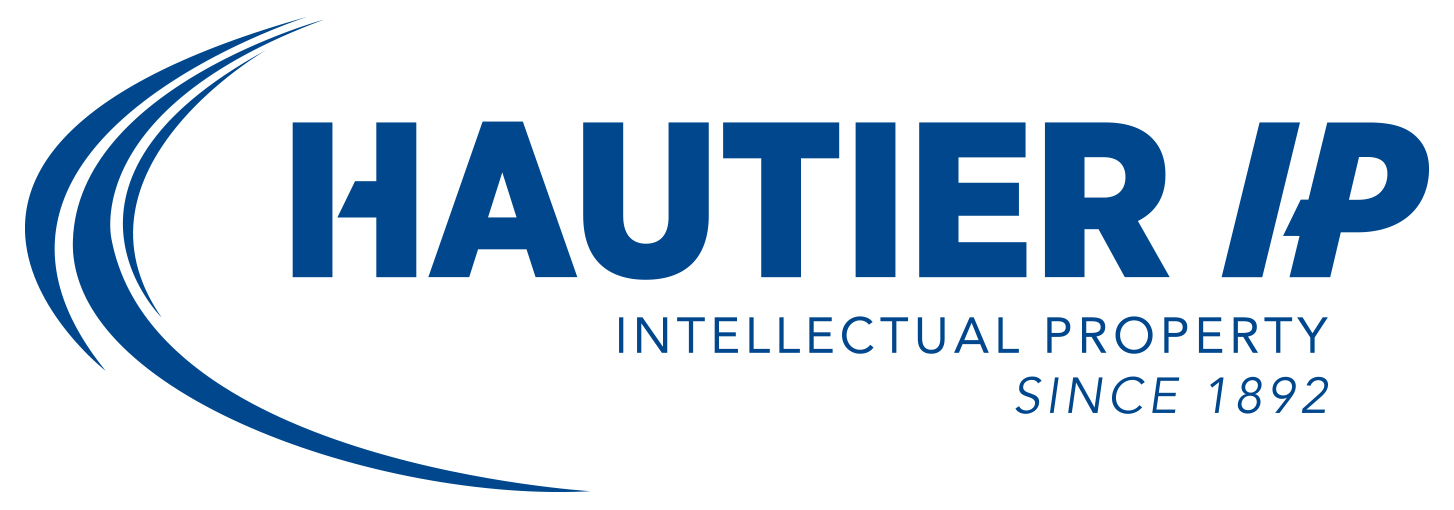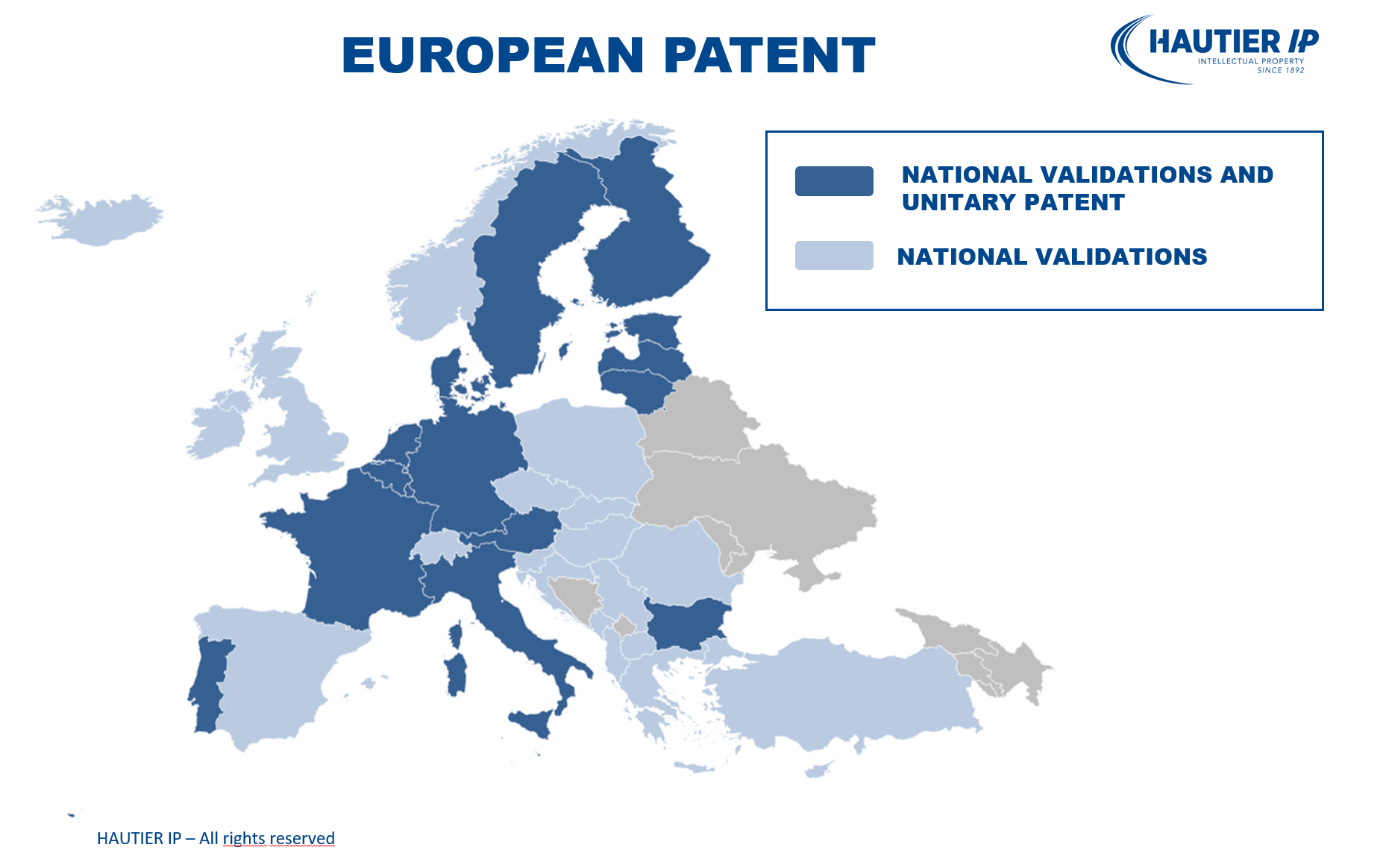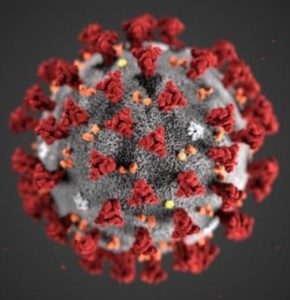The entry into force of the European Patent with Unitary Effect is scheduled for June 1, 2023. It will then be possible for European patent holders to apply for a single patent that will produce legal effects in 17 States*:
France, Germany, Austria, Belgium, Bulgaria, Denmark, Estonia, Finland, Italy, Latvia, Lithuania, Luxembourg, Malta, the Netherlands, Portugal, Slovenia, and Sweden.
The main differences with the current European Patent system to remember:
Today, the European Patent Office (EPO) examines patent applications and grants European patents. When the patents are granted, the owners proceed to the selection of the Member States (to be chosen among 39 States**) in which the European patent will be effectively validated: these are the national parts of the European patent. The patents will only produce their legal effects within the States of validation, as long as the renewal fees are paid annually to each national office.
The budget for carrying out the national validations varies significantly according to the requirements of each State. Indeed, if the cost of a European validation in certain States, such as France or Germany, remains easily accessible for patent holders (due to simplified formalities), the validation rules for other States can sometimes be complex and often require a larger budget (due, for example, to translation requirements in the local language, as for Italy). This budget variation is also reflected in the annual renewal fees.
With the unitary patent: the examination and granting process will not change! Indeed, the EPO will continue to examine applications and grant European patents.
However, once the European patent will be granted, the patent owner will be able to choose to request the application of the unitary effect. The formalities for obtaining this patent are unified and therefore simplified, since the request will be directed to a single office. An attractive lump-sum application and renewal fee budget will allow a large-scale protection while improving the predictability of expenses.
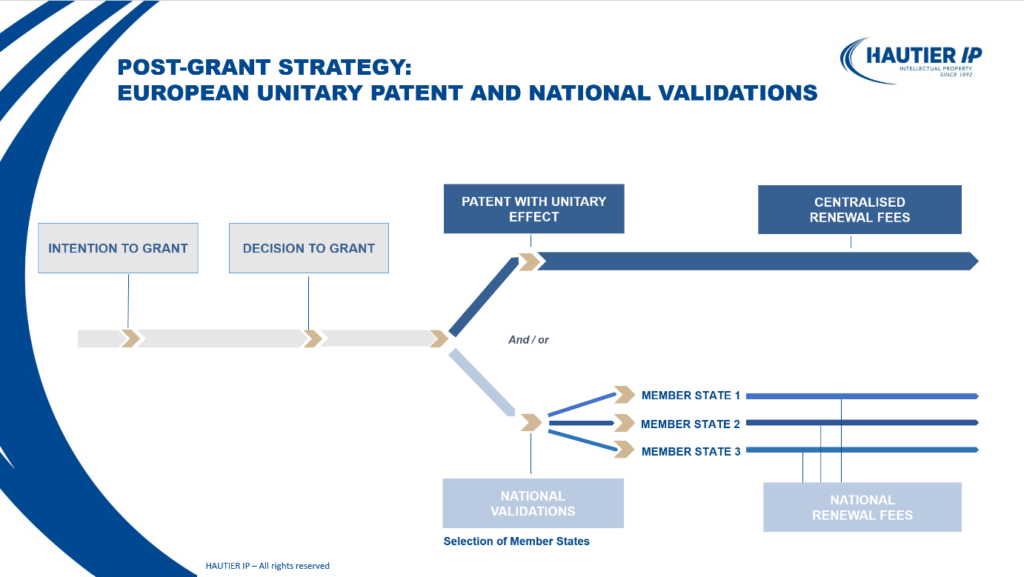
The advantages of the European Patent with unitary effect:
The budget for requesting unitary effect will be established on the basis of a very attractive package. The annual renewal fees will be centralized.
The formalities for obtaining the unitary patent are simplified: the request for unitary effect is obtained upon request of the owner and upon provision of a translation of the patent into English, without certification requirement.
Finally, it is essential to underline that one of the major assets of this new system is the scope of its protection. The unitary patent will have a geographical scope that will often be greater than a classic European patent, which should result in an increase in its economic value. The Europe of patents finally has a legal tool that is intended to be strengthened and that tends to become a real competitive advantage for companies on the territory.
…, but some points of attention as well:
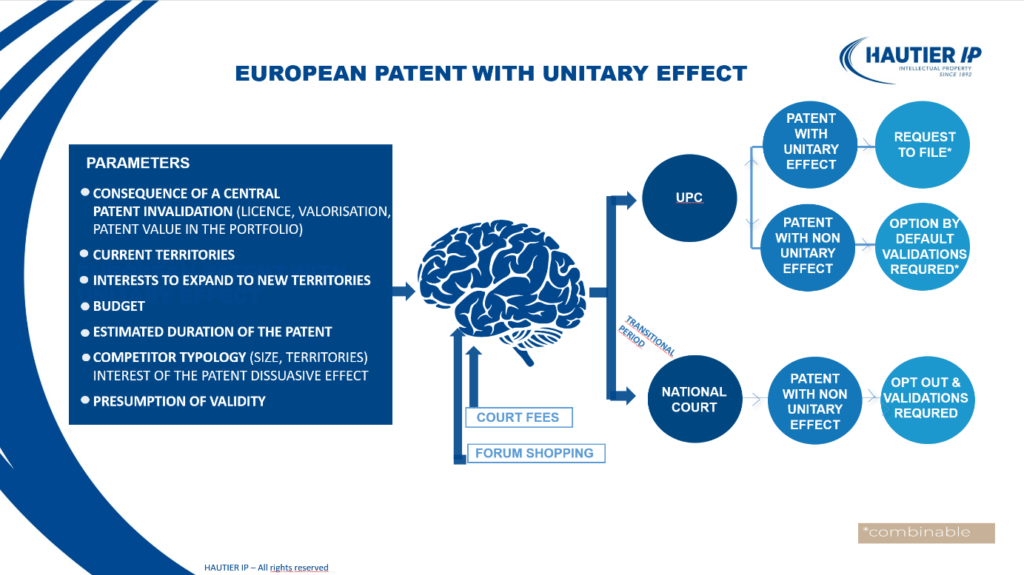
A first aspect that should be noted is the absence of certain strategic States from the Unitary Patent. This is the case, for example, of Spain, the United Kingdom and Switzerland, which do not adhere to the unitary system for the moment. In fact, it will be necessary for patent owners to take this factor into account when elaborating their choice of post-grant protection. In this respect, the current system of validations will always present a certain attractiveness alongside the unitary patent, particularly in the early stages. The combination of these two systems, traditional validations and the new unitary patent, could moreover very often be the strategy to be favored. Indeed, opting for the unitary patent and proceeding, in addition, to national validations in certain countries will make it possible to obtain protection not only within the 17 States of the unitary patent, but also in the countries absent from the system for which a protection will be relevant.
A second aspect, which has major consequences in case of litigation, is that litigation based on a European patent with unitary effect (mainly infringement and invalidity) will be subject to the exclusive jurisdiction of the Unified Patent Court (UPC).
A single decision of the UPC will apply in all countries of the unitary patent, … with the risk of losing the patent in all states of the unitary patent if an invalidity decision is rendered.
Another important aspect is that the unitary patent, as a single title, offers a “frozen” scope of protection in space that will not be subject to change. In other words, it will not be possible to abandon the patent within one of the countries without abandoning the entire unitary patent. It will also not be possible to assign the unitary patent for part of the countries it covers (the assignment can only be made for the whole unitary patent).
Two transitional measures applicable as of January 1, 2023:
To encourage the use of this new unitary patent, the EPO has introduced two transitional measures that will be applicable as of January 1, 2023. From this date, the owners of patent applications for which the EPO has notified an intention to grant (notification issued under rule 71.3 EPC) will be able to:
– request the unitary effect in advance, or
– request a delay in issuing the decision to grant a European patent.
If no action is taken, the grant will result in a European patent with non-unitary effect, i.e. a classic European patent in accordance with the system in force for several decades (with national validations).
Important choices will thus be imposed on each company, large or small, and in the very short term. We can assist you during this transition period in preparing your strategy with regard to this new system. Do not hesitate to contact us to discuss about it!
*This number is intended to increase in the future depending on the ratification by other States of the texts establishing the Unitary Effect Patent.
** Albania, Austria, Belgium, Bulgaria, Switzerland, Cyprus, Czech Republic, Germany, Denmark, Estonia, Spain, Finland, France, United Kingdom, Greece, Hungary, Croatia, Iceland, Ireland, Italy, Liechtenstein, Lithuania, Luxembourg, Latvia, Monaco, Montenegro, Macedonia, Malta, Netherlands, Norway, Poland, Portugal, Romania, Serbia, Sweden, Slovenia, Slovakia, San Marino, Turkey.
